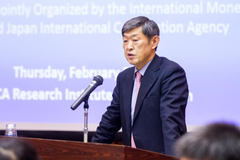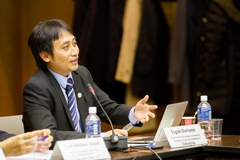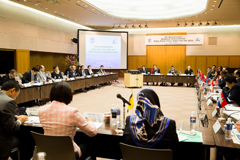Visiting Scholar Teguh Dartanto Discusses Fiscal Space for Financing Indonesia's UHC at IMF-JICA Conference
2017.02.10
The Japan International Cooperation Agency and the International Monetary Fund (IMF) held a joint conference on February 2, 2017, entitled “Regional Development: Fiscal Risks, Fiscal Space and the Sustainable Development Goals,” at the JICA Ichigaya Building in Tokyo. The conference brought together ministerial and director-general-level policy makers and researchers from 12 Asian countries. JICA Research Institute visiting scholar Teguh Dartanto (also the head of the Poverty and Social Protection Research Group, Institute for Economic and Social Research (LPEM) and the director of the Undergraduate Program in Economics, Faculty of Economics and Business, Universitas Indonesia) presented on fiscal space (*1) for financing a universal health coverage (UHC) (*2) in Indonesia.
Shinichi Kitaoka, president of JICA, gave the keynote speech, along with Masatsugu Asakawa, vice minister of Finance for International Affairs, Ministry of Finance, Japan, and Mitsuhiro Furusawa, the deputy managing director of IMF.
Kitaoka said that the two global agreements in 2015, the Sustainable Development Goals (SDGs) and the Paris Agreement, and the subsequent rise of populism in 2016 represent the opportunities and challenges of globalization and that we are at a juncture to reflect on the world we are to live in. He emphasized that the SDGs should be achieved through country-led efforts and, therefore, the role of financial and monetary authorities, who support political leadership in each country, is important. He then emphasized that economic resilience is necessary for peace and stability in Asia.

Shinichi Kitaoka, president of JICA
In the session “Fiscal Space Towards SDGs—How to Create Fiscal Space for Future Investment Towards SDGs and Real Income Convergence,” Dartanto spoke about fiscal risks and fiscal space for financing a UHC in Indonesia.
Dartanto explained Indonesia’s UHC scheme introduced in 2014. He said that its coverage was 66 percent in 2016; therefore, 34 percent remains uncovered. The lack of coverage is mostly in the informal sector because the government has focused on low-income groups and formal-sector workers in the initial stage. This approach has led to the “missing middle” problem in which the non-poor informal sector workers have remained uncovered. Since the proportion of the non-poor informal sector in the total population is large, the big challenge Indonesia is facing is mandating the large numbers of vulnerable informal sector workers to join the program.
Further, he indicated that the government subsidy for low-income groups and claim ratio are on the rise, thus posing a fiscal risk. He said that the cost of a UHC would almost double from 1.9 percent of government expenditure in 2014 to 4.5 percent in 2030.

Teguh Dartanto, JICA Research Institute visiting scholar
He concluded that a UHC could be achieved in 2030 by improving the collection rate and controlling the cost of health services and promoting healthy behavior (reducing morbidity through public health activities).
Koki Hirota, the chief economist of JICA, moderated the session entitled “Public Financial Management in Resource Rich Countries,” in which Noriharu Masugi of JICA discussed with representatives from Brunei Darussalam, Mongolia, and Myanmar. Yasushi Kanzaki, the senior vice president of JICA, stated that the importance of various issues related to fiscal management was recognized in the discussion, from human resource to disaster risk reduction. He concluded that JICA would work to assist domestic resource mobilization and disaster risk reduction as well as quality infrastructure and UHC as the achievement of the SDGs requires multi-sectorial cooperation.

The IMF-JICA conference brought together policy makers and researchers from 12 Asian countries.
Note:
(*1) Fiscal space indicates the degree of fiscal margin. One of its definitions is the difference between the debt ceiling (the level at which the debt could increase unrestrictedly in case of a sudden increase in interest rates, etc.) and the current debt level. The lack of fiscal space is not a default condition but indicates the necessity to conduct a bold measure to gain fiscal soundness.
(*2) Universal health coverage (UHC) is to ensure all people obtain the health services they need without suffering from financial hardships.

事業事前評価表(地球規模課題対応国際科学技術協力(SATREPS)).国際協力機構 地球環境部 . 防災第一チーム. 1.案件名.国 名: フィリピン共和国.

事業事前評価表(地球規模課題対応国際科学技術協力(SATREPS)).国際協力機構 地球環境部 . 防災第一チーム. 1.案件名.国 名: フィリピン共和国.

事業事前評価表(地球規模課題対応国際科学技術協力(SATREPS)).国際協力機構 地球環境部 . 防災第一チーム. 1.案件名.国 名: フィリピン共和国.

事業事前評価表(地球規模課題対応国際科学技術協力(SATREPS)).国際協力機構 地球環境部 . 防災第一チーム. 1.案件名.国 名: フィリピン共和国.

事業事前評価表(地球規模課題対応国際科学技術協力(SATREPS)).国際協力機構 地球環境部 . 防災第一チーム. 1.案件名.国 名: フィリピン共和国.
scroll